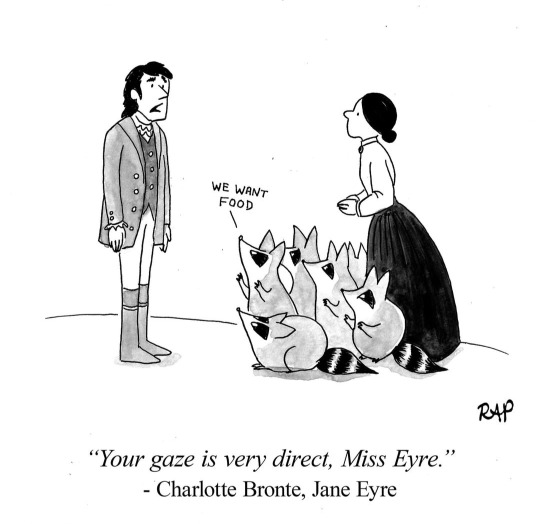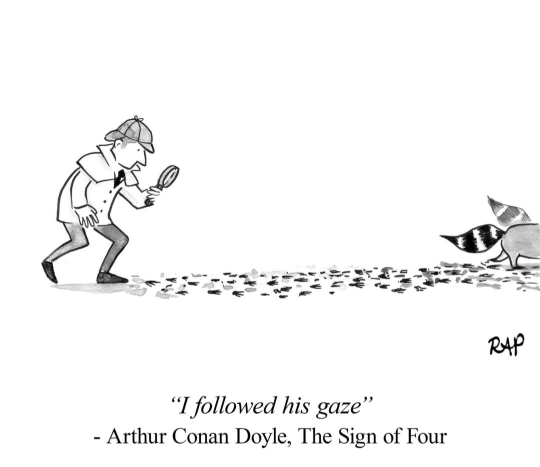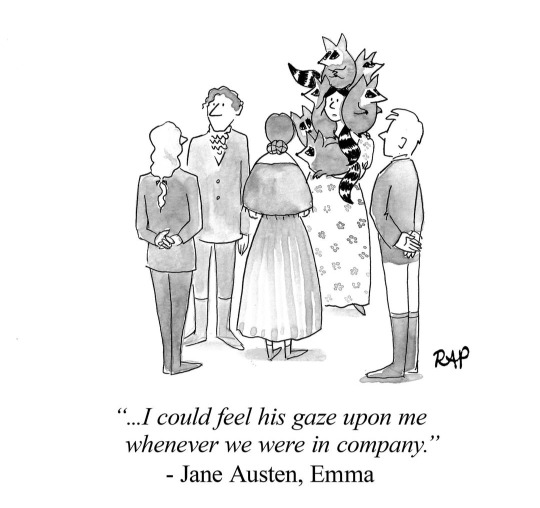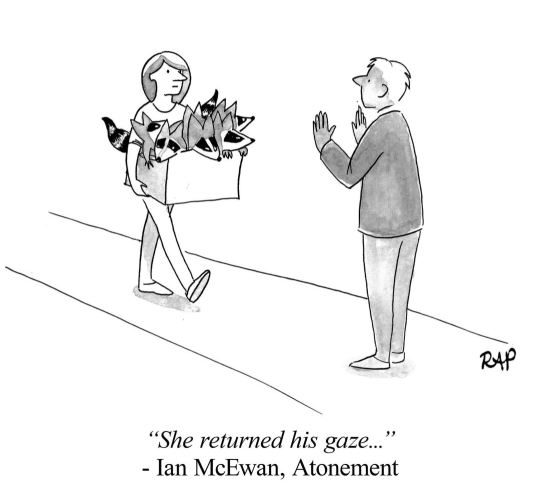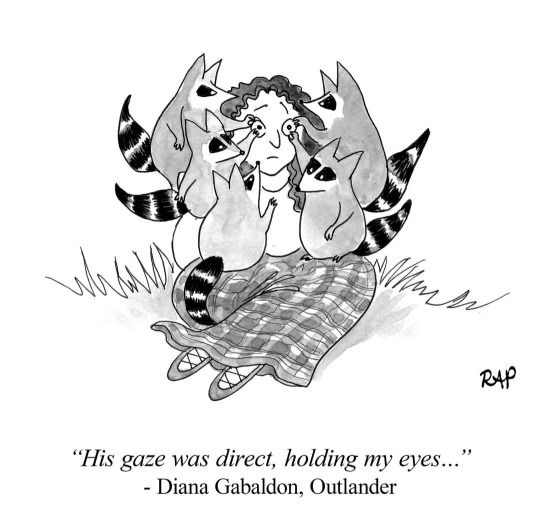Don't wanna be here? Send us removal request.
Text
Do you ever think about how staggeringly in bad taste it is that Gandalf brought a firework that turns into Smaug to Bilbo’s birthday party
Like how were you hoping that would go
98K notes
·
View notes
Text
I am a huge fan of retiring to my quarters
206K notes
·
View notes
Text
I hate these motherfuckers and I hate everybody whose actions contributed in any way whatsoever to how we got here. None of this bullshit needs to be happening and none of it would be if enough people had pulled their heads out of their asses on or before November 5, 2024.
6K notes
·
View notes
Text

𝙸 𝚊𝚖 𝚗𝚘 𝚖𝚊𝚗! November 05, 2024 at 03:37PM via Instagram https://instagr.am/p/DB_ke7Io19l/
483 notes
·
View notes
Text
hi i’m tolkien here are my ocs. i call them Elves (not elfs!!! if you call them elfs i will block you) they look like humans but they’re tall, live forever, and have pointy ears. that’s it bye
434K notes
·
View notes
Text
Trump and Musk illegally destroying USAID is already killing people, and will kill hundreds of thousands more every year. And they have the fucking temerity to laugh and say “oops, my bad” about it. Its absolutely ghoulish
0 notes
Text




a frosty saturday finds this lot out playing in the snow, even hermione in her own way. (she's doing recreational reading, not for school! sure it's potion theory, but it's not homework!) and ron is about one second away from getting a huge pile of snow dropped on his head.
481 notes
·
View notes
Text
Frodo Didn’t Fail
The climactic scene of The Lord of the Rings, when Frodo and Sam reach the Cracks of Doom, is one of my favorite scenes in all of literature. So I was very interested a little while back when noted Tolkien scholar Stephen Colbert laid out a neat little analysis of the scene. Frodo seems to fail at his appointed task – rather than throwing the ring into the fire, he claims it for himself, and the ring is only destroyed by the coincidental intervention of Gollum. Colbert then notes that Gandalf should have known that Frodo would fail. Back in the second chapter, Frodo demonstrated to Gandalf his inability to throw the ring into the much cooler fires of his own hearth, after having only possessed the ring for a few hours. Therefore, one may assume, Gandalf must have intended for one of the other members of the Fellowship to intervene and ensure the ring’s destruction.
Colbert’s analysis is clever, in the same way that the theory that Gandalf had intended all along to use the eagles to reach Mordor is clever. In its cleverness, though, I think such analyses risk treating LotR as a D&D campaign and thus losing sight of the real literary themes of the story.
One of Tolkien’s key themes is the Augustinian view of evil. Most genre fiction takes a decidedly Manichean view of evil – a view that holds that evil and good are two great opposing forces in the world, like the light and dark sides of The Force. In a Manichean view, good must triumph by opposing evil, either to eradicate it or to restore a balance to the universe.
Manichean views of evil lead to a very common type of climax to stories: the contest of wills. Our hero confronts the villain, and through superior courage, grit, love, or what-have-you, they overcome the villain and their evil power. It’s Harry going wand-to-wand with Voldemort, Thomas Covenant laughing at Lord Foul, Meg breaking IT’s hold over Charles Wallace, Luke facing down Vader and Vader facing down the Emperor.
Any other writer could have given us a very typical Manichean Cracks of Doom scene. Frodo approaches the fire, and the ring’s temptation overtakes him. He puts the ring on and begins to claim it. But a tiny voice somewhere deep inside him insists that this is wrong. Sam cries out, and thinking about Sam’s love and devotion rekindles a spark in Frodo. His Hobbitish desire for food and good cheer wells up, and he tears the ring off and throws it into the fire. A dramatic ending and a nice echo of the moral of The Hobbit.
But that’s not what happens. Frodo’s goodness – even the innocent goodness of a little old Hobbit – can’t go toe-to-toe with Sauron’s evil. Indeed, Isildur proved it. He defeated Sauron by opposing him with the force of good, and defeated him. But Isildur couldn’t destroy the ring, and within the year it had destroyed him.
Tolkien holds instead to an Augustinian view of evil. Evil, according to St. Augustine, is not a force of its own, but rather is the absence or corruption of good. We see this most explicitly in the idea that Morgoth and Sauron can’t create anything of their own, but only corrupt and warp what has been created by others. We also see it when Gandalf and Galadriel describe what would happen if they took the ring – it would warp their own desire to do good until they became evil.
An Augustinian climax can’t involve a contest of wills between good and evil. In an Augustinian world, evil can only exist by leeching off of good. So evil must be given an opportunity to destroy itself, much like the self-defeating band of thieves described by Plato (on whose philosophy Augustine drew heavily). Good wins by renouncing evil, not by overcoming it.
And that’s exactly what happens at the Cracks of Doom. The ring isn’t destroyed because Frodo’s force of good overcame the ring’s evil. Nor is Gollum’s intervention a coincidence or deus ex machina (like the series of disarmings that happened to make Harry the master of the Elder Wand). Rather, the ring’s evil collapsed in on itself by drawing Gollum. The very corruption of Gollum that enabled the ring to escape the river drove him to wrestle desperately with Frodo for it and ultimately fall to his doom, ring in hand.
An Augustinian view of evil has definite moral implications, which are also shown throughout The Lord of the Rings. A Manichean world is a consequentialist world. To defeat the forces of evil, we need to think strategically. Sometimes we may even need to indulge in a little short-term evil in order to be able to achieve the greater good. But an Augustinian world can’t allow that kind of pragmatic approach. In an Augustinian world, any compromise with evil can only strengthen it, giving it an infusion of good that delays its self-destruction. An Augustinian world demands a deontological ethic, doing the right thing regardless of the outcome.
Again and again in The Lord of the Rings, we see that strategically pursuing the greater good fails, while remaining true to moral principles succeeds even when it looked foolish. On the cautionary side, we have Saruman and Denethor. Though they may point to the palantir as an excuse, they each ultimately made a thoroughly reasonable choice in the face of Sauron’s overwhelming advantage – to ally with him while playing the long game, or to give in to despair. Our heroes, on the other hand, repeatedly make foolish decisions based on hope. Aragorn is a good example – he decides to pursue Merry and Pippin because he owes them protection even though Frodo is the one who holds the fate of the world in his hands. Later, he decides to make a suicide attack on the Morannon rather than hunkering down in Minas Tirith, in the hopes of Frodo’s quest succeeding.
But the most important instance of doing the right thing despite the consequences comes from Frodo himself: he refuses to kill Gollum. Killing Gollum would have been an eminently reasonable idea – he’s a slinker and a stinker, and we know that he never redeemed himself or turned over a new leaf. Indeed, his main accomplishments were to lead Frodo and Sam into a death trap, then to try to kill them with his own hands at the Cracks of Doom. Both Sam and Faramir were right when they said that killing Gollum would have been a good idea!
But Frodo showed Gollum pity and spared his life because it was the right thing to do. And just like Gandalf could see Frodo’s unwillingness to destroy the ring back in Bag End, he also addressed this very issue. He instructed Frodo:
Frodo: It’s a pity Bilbo didn’t kill him when he had the chance.
Gandalf: Pity? It was pity that stayed Bilbo’s hand. Many that live deserve death. Some that die deserve life. Can you give it to them, Frodo? Do not be too eager to deal out death in judgment. Even the very wise cannot see all ends. My heart tells me that Gollum has some part to play yet, for good or ill before this is over. The pity of Bilbo may rule the fate of many.
And in the end, that pity was what saved the world. Frodo’s pity made it possible for Gollum to be there at the Cracks of Doom to take the ring. Frodo refused to give in to the small, reasonable evil of killing Gollum, and so he left the great evil of the ring exposed to destroy itself. That was Gandalf’s backup plan, not Aragorn’s strength to take the ring and destroy it. And so Frodo didn’t really fail. He succeeded at his quest back when he saved Gollum’s life, when he did the right thing even though it seemed foolish.
25K notes
·
View notes
Text
Hello, dear chaos agents of the internet!
The new techno-fascist overlords over at the Department of Education have decided that they're going to go after DEI (Diversity, Equity, and Inclusion) initiatives in public education, much as they have in all other aspects of public life.
And they have created a handy form by which the public can report any DEI initiatives at their schools!

It sure would be awful if someone were to, I don't know, flood this with so much bullshit as to render it unusable. I mean, it seems like it would be pretty easy to write some code to do that! But that would be bad, and one certainly hopes there aren't bad actors like that out there.
Anyway. If you would like to investigate for yourself, you can find the form here: https://enddei.ed.gov/
9 notes
·
View notes
Text

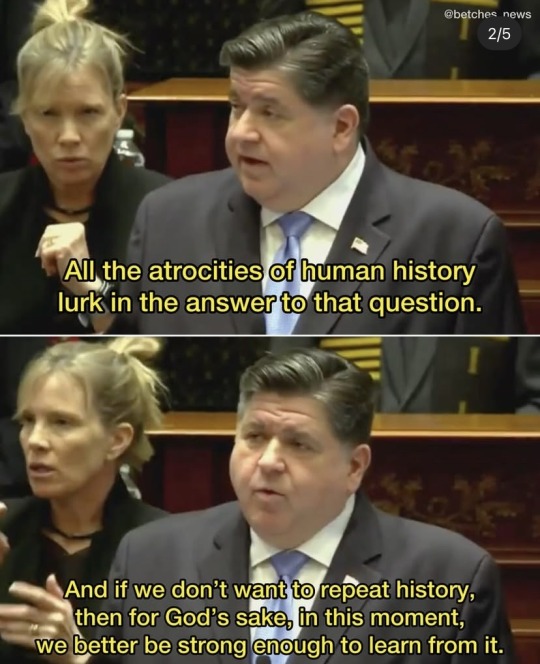
There are people – some in my own Party – who think that if you just give Donald Trump everything he wants, he’ll make an exception and spare you some of the harm. I’ll ignore the moral abdication of that position for just a second to say — almost none of those people have the experience with this President that I do. I once swallowed my pride to offer him what he values most — public praise on the Sunday news shows — in return for ventilators and N95 masks during the worst of the pandemic. We made a deal. And it turns out his promises were as broken as the BIPAP machines he sent us instead of ventilators. Going along to get along does not work – just ask the Trump-fearing red state Governors who are dealing with the same cuts that we are. I won’t be fooled twice.
I’ve been reflecting, these past four weeks, on two important parts of my life: my work helping to build the Illinois Holocaust Museum and the two times I’ve had the privilege of reciting the oath of office for Illinois Governor.
As some of you know, Skokie, Illinois once had one of the largest populations of Holocaust survivors anywhere in the world. In 1978, Nazis decided they wanted to march there.
The leaders of that march knew that the images of Swastika clad young men goose stepping down a peaceful suburban street would terrorize the local Jewish population – so many of whom had never recovered from their time in German concentration camps.
The prospect of that march sparked a legal fight that went all the way to the Supreme Court. It was a Jewish lawyer from the ACLU who argued the case for the Nazis – contending that even the most hateful of speech was protected under the first amendment.
As an American and a Jew, I find it difficult to resolve my feelings around that Supreme Court case – but I am grateful that the prospect of Nazis marching in their streets spurred the survivors and other Skokie residents to act. They joined together to form the Holocaust Memorial Foundation and built the first Illinois Holocaust Museum in a storefront in 1981 – a small but important forerunner to the one I helped build thirty years later.
I do not invoke the specter of Nazis lightly. But I know the history intimately — and have spent more time than probably anyone in this room with people who survived the Holocaust. Here’s what I’ve learned – the root that tears apart your house’s foundation begins as a seed – a seed of distrust and hate and blame.
The seed that grew into a dictatorship in Europe a lifetime ago didn’t arrive overnight. It started with everyday Germans mad about inflation and looking for someone to blame.
I’m watching with a foreboding dread what is happening in our country right now. A president who watches a plane go down in the Potomac – and suggests — without facts or findings — that a diversity hire is responsible for the crash. Or the Missouri Attorney General who just sued Starbucks – arguing that consumers pay higher prices for their coffee because the baristas are too “female” and “nonwhite.” The authoritarian playbook is laid bare here: They point to a group of people who don’t look like you and tell you to blame them for your problems.
I just have one question: What comes next? After we’ve discriminated against, deported or disparaged all the immigrants and the gay and lesbian and transgender people, the developmentally disabled, the women and the minorities – once we’ve ostracized our neighbors and betrayed our friends – After that, when the problems we started with are still there staring us in the face – what comes next.
All the atrocities of human history lurk in the answer to that question. And if we don’t want to repeat history – then for God’s sake in this moment we better be strong enough to learn from it.
I swore the following oath on Abraham Lincoln’s Bible: “I do solemnly swear that I will support the constitution of the United States, and the constitution of the state of Illinois, and that I will faithfully discharge the duties of the office of Governor .... according to the best of my ability.
My oath is to the Constitution of our state and of our country. We don’t have kings in America – and I don’t intend to bend the knee to one. I am not speaking up in service to my ambitions — but in deference to my obligations.
If you think I’m overreacting and sounding the alarm too soon, consider this:
It took the Nazis one month, three weeks, two days, eight hours and 40 minutes to dismantle a constitutional republic. All I’m saying is when the five-alarm fire starts to burn, every good person better be ready to man a post with a bucket of water if you want to stop it from raging out of control.
Those Illinois Nazis did end up holding their march in 1978 – just not in Skokie. After all the blowback from the case, they decided to march in Chicago instead. Only twenty of them showed up. But 2000 people came to counter protest. The Chicago Tribune reported that day that the “rally sputtered to an unspectacular end after ten minutes.” It was Illinoisans who smothered those embers before they could burn into a flame.
Tyranny requires your fear and your silence and your compliance. Democracy requires your courage. So gather your justice and humanity, Illinois, and do not let the “tragic spirit of despair” overcome us when our country needs us the most.
Sources:
• NBC Chicago & J.B. Pritzker, Democratic governor of Illinois, State of the State address 2025: Watch speech here | Full text
• Betches News on Instagram (screencaps)
89K notes
·
View notes
Text
Because of its explosive nature, not all applications of nitrocellulose were successful. In 1869, with elephants having been poached to near extinction, the billiards industry offered a US$10,000 prize to whoever came up with the best replacement for ivory billiard balls. John Wesley Hyatt created the winning replacement, which he created with a new material he invented, called camphored nitrocellulose—the first thermoplastic, better known as celluloid. The invention enjoyed a brief popularity, but the Hyatt balls were extremely flammable, and sometimes portions of the outer shell would explode upon impact. An owner of a billiard saloon in Colorado wrote to Hyatt about the explosive tendencies, saying that he did not mind very much personally but for the fact that every man in his saloon immediately pulled a gun at the sound.
16K notes
·
View notes



















